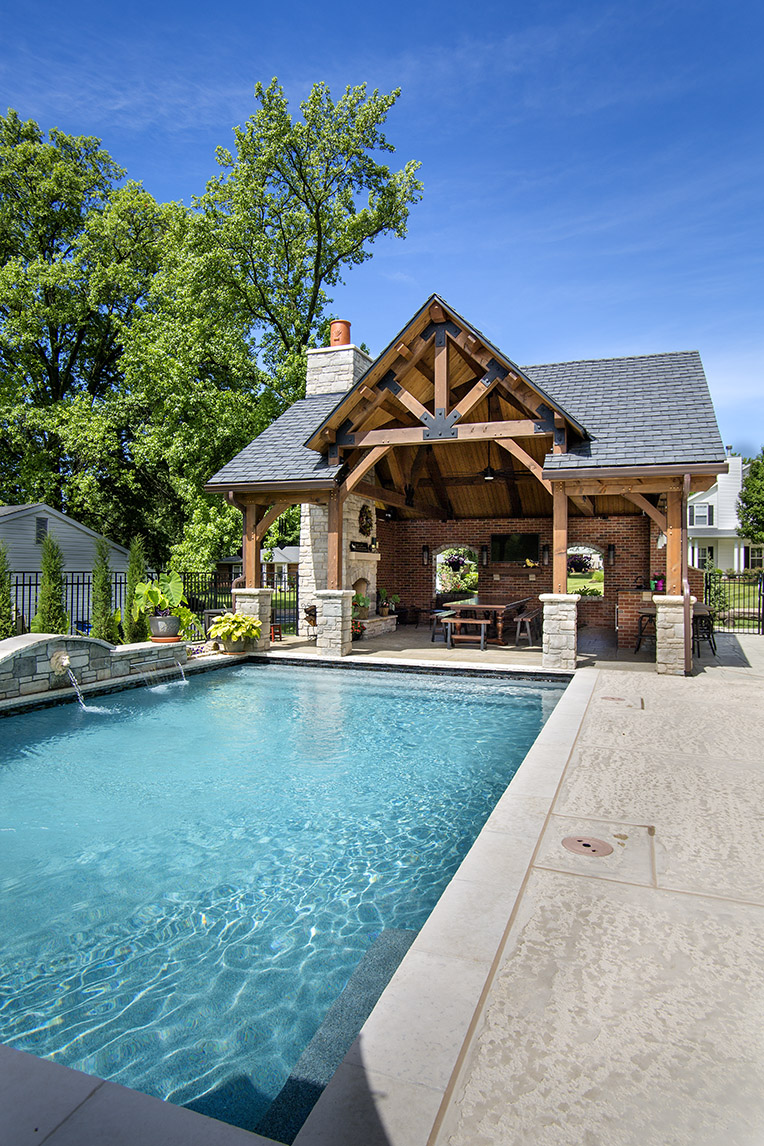Hi! How can we help you?
Geothermal Heat Pump F.A.Q.s
You’ve got questions. We have the answers.
Geothermal heat pumps (or geothermal systems) are referred to as ground source heat pumps because they use stored solar energy underground, known as ground source energy, to comfortably heat and cool homes and buildings.
If you’re planning to install a PV solar system, a geothermal heat pump is the best heating and cooling provider for optimal energy-efficiency and savings. Because geothermal only uses one unit of electricity to move up to five units of heating or cooling from the earth to the structure, a PV solar system can easily provide the needed electricity to power the system, and even cover the entire house if sized correctly.
Check out the PV solar section of our site to learn more.
You can use a geothermal heat pump to heat your swimming pool all year, and it’s an efficient way to do so. Below, there is a picture of a pool heated by geothermal and the equipment used to keep it comfortable.


Definitely! Geothermal heat pumps are flexible, and with a variety of product options, can be installed in several ways to meet your home’s needs. Typically, a geothermal heat pump completely replaces your traditional HVAC system, and is kept in a mechanical room, attic, or closet in the home.
If you’re limited on space indoors, you could use a split system. Part of the unit is kept outdoors with a cabinet that protects it from the elements, and the other half of the system is indoors.
There’s also a hybrid system. In this scenario, your geothermal heat pump supplements the existing traditional system if your furnace is still in good condition, or this option may appeal to you if you live in a very cold area. With this method, the geothermal system supplies 90% of your home’s heating requirements, and the traditional system kicks on when the temperature outside gets very low. Geothermal heat pumps work by themselves in very cold conditions, but when paired with a traditional system, the combination can create the optimal solution for a home or building’s needs.
Geothermal heat pumps have a life expectancy of 22 – 25 years (although many last beyond this), and the ground loops installed underground have an indefinite lifespan (100 years plus) with a 50-year warranty. This is longer than a traditional system, which may not be used all year round due to heating and cooling seasons, with a lifespan of 13 – 15 years.
If the ground loop system has been installed, the geothermal heat pump, kept indoors, can typically be replaced with no more labor or additional costs than a traditional system.
The earth absorbs and stores just shy of 50% of the sun’s solar energy. The ground loop system powering the geothermal heat pump harnesses that renewable energy to heat and cool homes and buildings. Traditional heating and cooling methods like propane, natural gas, air-source, mini-splits, etc. do not use a constant, renewable energy to operate, making them less cost-effective to operate and less environmentally-friendly.
Traditional heating and cooling technologies that rely on fossil fuels will never be as efficient as geothermal heat pumps because combustion (flames) are required to heat. Air-source and ductless systems are not as energy-efficient as geothermal because these technologies must create warm or cold air based on the temperature outside, which can be well below freezing, or get incredibly hot. Geothermal transfers heat from the moderate and consistent temperatures below ground instead of the varying outdoor conditions.
Geothermal heat pumps can be installed in homes, buildings, and yards big and small. The different types of ground loops are used to create installation flexibility. As long as there’s a 10×10 area of land, a vertical ground loop system will do the job.
Almost everywhere! Geothermal heat pumps work in city dwellings, suburbs, or rural areas; in varying climates ranging from the mountains to the Caribbean; in older homes and buildings or new construction; and in small or larger structures. We’ve even seen geothermal used to keep greenhouse temperatures consistent all year long. Because of product versatility, geothermal heat pumps meet almost any need.
Our CEO shares a bit of humor and answers this best. In his 30+ years of experience, he’s only found two drawbacks to geothermal heat pumps: higher initial installation cost and the displacement of earth worms.
The matter of higher upfront installation cost is remedied by flexible payment plans and cost-savings on operation and maintenance, and the earth worms will find a different place to dig.
Didn’t find the answer to your question?
Let us know what your question is, and we’ll get you an answer.